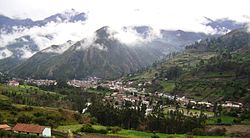San Marcos District is one of sixteen districts of the Huari Province in Peru.[1]
San Marcos | |
|---|---|
 San Marcos | |
 | |
| Country | |
| Region | Ancash |
| Province | Huari |
| Capital | San Marcos |
| Government | |
| • Mayor | Christian John Palacios Laguna |
| Area | |
• Total | 556.75 km2 (214.96 sq mi) |
| Elevation | 2,964 m (9,724 ft) |
| Population (2017) | |
• Total | 17,033 |
| • Density | 31/km2 (79/sq mi) |
| Time zone | UTC-5 (PET) |
| UBIGEO | 021014 |
Geography
editOne of the highest peaks of the district is Pukarahu at approximately 5,000 m (16,000 ft). Other mountains are listed below:[2]
- Allpa Qucha
- Anku
- Atuq
- Awaq Wank'a
- Chakaq Munti
- Hatun Chakra
- Hatun Punta
- Ichik Challwa
- Iskay Wank'a
- Isku Punta
- Kinwa Hirka
- Kunkayuq
- Kunkush
- Kuta Kancha
- K'ara K'ara
- Millwa Pillu
- Purway Kinwa
- Puywan
- Qacha Kancha
- Qucha Pata
- Rukutu
- Tampu
- Tankan
- Tullu Qallpa
- T'uqu
- Uqsha Tuna
- Urqu Pintay
- Waman Wayi
- Yanaqucha
- Yuraq Mach'ay
- Yuraq Wank'a
Demographics and data
editThe people in the district are mainly indigenous citizens of Quechua descent. Quechua is the language which the majority of the population (72.16%) learnt to speak in childhood, 27.31% of the residents started speaking using the Spanish language (2007 Peru Census).[3] According to the Foreign Trade Society of Peru (Comex), the district had one of the highest incomes in Peru as of 2023 due to mining and governmental contracts, though its citizens live in poor conditions due to the mismanagement of funds.[4] The majority of citizens do not have access to sewer drainage, nearly 15% of children suffer from malnutrition and 90% of roads are unpaved.[4]
References
edit- ^ (in Spanish) Instituto Nacional de Estadística e Informática. Banco de Información Distrital Archived 2008-04-23 at the Wayback Machine. Retrieved April 11, 2008.
- ^ escale.minedu.gob.pe/ UGEL map Huari Province (Ancash Region)
- ^ inei.gob.pe Archived 2013-01-27 at the Wayback Machine INEI, Peru, Censos Nacionales 2007, Frequencias: Preguntas de Población: Idioma o lengua con el que aprendió hablar (in Spanish)
- ^ a b Nomberto, Isabel (2023-07-29). "Ni San Isidro ni La Molina: ¿cuál es el distrito más rico del Perú?". La República (in Spanish). Retrieved 2023-07-30.
9°31′01″S 77°13′59″W / 9.51694°S 77.23306°W